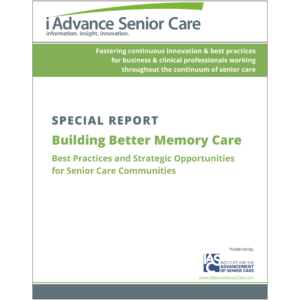How do I deal with an older employee who will not retire?
A reader from Ohio asks if a company can legally ask an older employee to retire, or establish a specific policy requiring retirement at a certain age. This is really a question for legal counsel, rather than a staffing issue. However, we will share some information generated over the years and in consultation with other administrators and an attorney.
This question was posed to a large group of administrators at an American College of Health Care Administrators symposium. The topic generated a great deal of discussion, but honestly, not one single solution. Not one administrator had identified a mechanism for dealing with the concern. This question is certainly an important and timely one. We are all experiencing an aging workforce and this will no doubt continue to be an issue well into the future, unless we begin to plan a strategy.
To address concerns regarding a specific individual, it is best to start with a sensitive discussion with the employee in question. Our hope is that administrators and all department managers have a caring relationship with long-term, loyal employees, and that a genuine rapport already exists. Staff members will be more receptive to difficult conversations when they know the concerns come from a place of mutual respect and compassion.
Begin by communicating to the staff member how valued they are, and how grateful the facility is for their loyal and long-term support. Share your personal observations and what concerns you may have. With their input, discuss what difficulties they may be experiencing in their current position. Safety may be a concern, as some positions are physically strenuous and/or mentally draining. Perhaps the position is fast-paced and the employee just has trouble keeping up.
| Rob Pivonka, a partner with the Ohio healthcare law firm of Rolf & Goffman, agrees that treatment of older employees should be consistent with how other employees are treated. He advises, “State and federal laws prohibit discriminating against individuals over 40 because of their age. This prohibition includes terminating employment for this reason. You can offer employees inducements to retire, but you generally cannot require that they retire. If an older employee is having work performance issues, you should focus on his or her ability (or inability) to perform the job duties and proceed with your usual process of training, counseling, and/or discipline. It is always a good idea to consult counsel when terminating an employee in a legally protected class.” |
Don’t limit these topics to job-related concerns. We know employees don’t want to fail, and certainly don’t want to feel as though they are aging and dispensable. Many older folks are experiencing losses in their own life, and it is important to have an understanding as to what factors at home may be impacting their work. Have they had a change in living arrangements or recently lost a spouse or other family member? Be aware of clues that may indicate depression or other medical concerns. Just like the residents you serve, older staff members may have recently added or changed medications that may temporarily affect their work.
Explore alternatives together. Can alterations be made to the current position? Would a change in shift or start time be possible? Is there another position available that may better accommodate the employee?
Afterward, give the staff member some time to reflect on your discussion. Allow them time to consider your concerns and suggestions. You may want to set up another meeting in a few days to review and revisit available options. Ask how the staff member is feeling and truly listen to their answer. Explore how you can continue a successful partnership. The employee may decide on their own to retire or set a date for retirement. They may agree to job modifications or transfers, or will have sought assistance for other life issues that may be interfering with job performance. Hopefully, by working together both facility and employee reach a mutually beneficial resolution.
However, if the employee denies having difficulties, resists potential changes, or is not open to communicating, the next step should include formal documentation. Regardless of age this individual must be treated the same as any other employee who is unable or unwilling to meet the expectations of their job. They know the job description, signed-off on it, and agreed to abide by the document.
Spell out in writing the specific concerns that exist with the staff member and job performance. Some examples might include a cook having difficulty managing specific tasks, performing tasks that require the minimum number of pounds for lifting, or preparing and serving dinner on time. Indicate that the facility has reviewed these concerns and, if appropriate, suggested alternative positions or job modifications. List what actions may occur if concerns continue with job performance, following your existing written policies on disciplinary action and termination (for example, verbal warning for first occurrence, and subsequent written and final written warnings). This summary of discussion—and all future disciplinary actions—should be signed by the staff member.
If needed, follow-through on disciplinary action. Consistency is the key, and unfortunately the facility may need to progressively discipline the employee to the point of termination. While this is a no-win situation for everyone, rest a little easier knowing you have cared for your employee, offered alternatives and suggestions, and treated them with dignity and respect. In the end, the choice is theirs.
I Advance Senior Care is the industry-leading source for practical, in-depth, business-building, and resident care information for owners, executives, administrators, and directors of nursing at assisted living communities, skilled nursing facilities, post-acute facilities, and continuing care retirement communities. The I Advance Senior Care editorial team and industry experts provide market analysis, strategic direction, policy commentary, clinical best-practices, business management, and technology breakthroughs.
I Advance Senior Care is part of the Institute for the Advancement of Senior Care and published by Plain-English Health Care.
Related Articles
Topics: Facility management , Staffing











